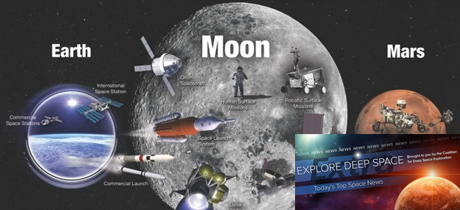In Today’s Deep Space Extra… NASA Administrator Jim Bridenstine stresses a human return to the Moon will prepare explorers for their next destination, Mars. The European Space Agency’s (ESA) vision of a Moon Village would offer a further opportunity for international cooperation in the human exploration of space.
Human Space Exploration
NASA chief sees bold future on Mars and the Moon
Space.com (11/11): Season 2 of the National Geographic Channel’s “Mars” series begins Monday night. In advance, NASA Administrator Jim Bridenstine joined a gathering of enthusiasts at National Geographic offices last week to assure them the return of human explorers to the Moon is to prepare for the future exploration of Mars, a destination now cold and dry that shows signs of being more Earth-like long ago. NASA’s Mars InSight lander is to touchdown on November 26, he noted, to help investigate that transition.
ESA’s space vision presented at Paris Peace Forum
European Space Agency (11/12): The weekend forum offered the ESA an opportunity to present its three year old “Moon Village” concept as a model for cooperative exploration of the lunar surface open to any nation and a possible next joint venture beyond the International Space Station (ISS). ESA Director General Jan Wörner who introduced the concept was among those from ESA at the forum as were 60 heads of state.
After rocket failure, Russia moves up its next launch. NASA says it is okay with that
Houston Chronicle (11/9): NASA astronaut Anne McClain spoke confidently of her launch to the International Space Station (ISS), possibly on December 3, with Canadian Space Agency astronaut David Saint-Jacques and cosmonaut Oleg Kononenko during interviews on Friday. The Russian launch from the Baikonur Cosmodrome is to be the first for a soyuz rocket with crew on board since the October 11 launch abort with NASA’s Nick Hague and cosmonaut Alexey Ovchinin. The soyuz capsule with the two men landed safely and an investigation identified the cause to be a valve sensor that was damaged during the pre-launch assembly of the rocket’s first stage.
Space Science
Capsule with ISS experiments aboard is recovered after splashing down into ocean near remote island
Japan Times (11/11): Japan’s small return capsule demonstrator descended successfully to Earth on Saturday, U.S. time, with an International Space Station (ISS) protein crystal growth experiment. The small return capsule concept could offer a new “on demand” means of returning experiments to Earth from the Space Station, an activity currently limited to scheduled returns of NASA contracted SpaceX resupply capsules and Russia’s soyuz crew return capsule.
Not all the Earth’s water came from comets
Universe Today (11/9): A new study suggests the Earth formed with at least some water in addition to that supplied by comet and asteroid impacts. The findings from Arizona State University scientists and others may have implications for the presence of water on rocky planets orbiting stars beyond the solar system.
Other News
$284 billion market for 3,300 satellites to be built & launched over next decade
Euroconsult (11/12): Marketing consultants Euroconsult forecast an average of 330 satellite launches annually over the next decade, worth an estimated total of $284 billion to those who manufacture and launch the spacecraft, an up to 25 percent increase over the previous decade. The optimistic outlook is based on a transition from large satellites to constellations of small sats for communications, navigation, weather and other Earth observations missions.
Russian hi-tech firms to develop design of new engine for reusable rocket by year end
TASS of Russia (11/9): Russia’s Energomash and S7 Space intend to prepare the technical specifics for a rocket engine based on a previous design for a reusable rocket first stage by year’s end.
NASA certifies SpaceX’s Falcon 9 for its most expensive, most complex missions
Florida Today (11/9): The NASA certification means the Falcon 9, Block 5 can launch the agency’s high priority science missions. The ranking follows six successful flights of the latest version of the Falcon 9.
Rocket Lab’s modest launch is giant leap for small rocket business
New York Times (11/10): Rocket Lab orbited a half dozen small satellites from New Zealand late Saturday, U.S. time. The launch featured a wide range of small satellite payloads and cleared past concerns over an Electron rocket first stage controller issue that had twice delayed the launch.
Major Space Related Activities for the Week
Major space related activities for the week of November 11-17, 2018
Coalition Member in the News – Northrop Grumman
Spacepolicyonline.com (11/11): Lots on the space policy front is scheduled for a work week that starts with a Veteran’s Day observance. Congress returns to Washington, with 2019 appropriations measures for a number of government agencies, including NASA and NOAA, unresolved beyond a continuing budget resolution that expires on December 7. A NASA contracted Northrop Grumman Cygnus re-supply mission launch to the International Space Station (ISS) from Wallops Island, Virginia, is planned for early Thursday. A Russian Progress re-supply mission to the International Space Station (ISS) is planned for a Friday liftoff. The Progress launch represents an important precursor for Russia’s plans to resume crewed soyuz launches to the Space Station on December 3 in the aftermath of the October 11 soyuz launch abort with a two man U.S. and Russian crew. Both space freighters are to reach to the Space Station next Sunday.

